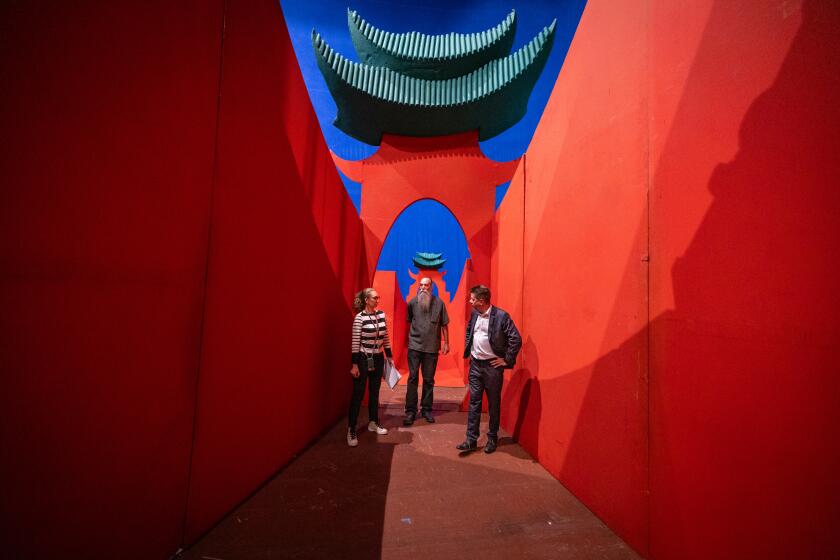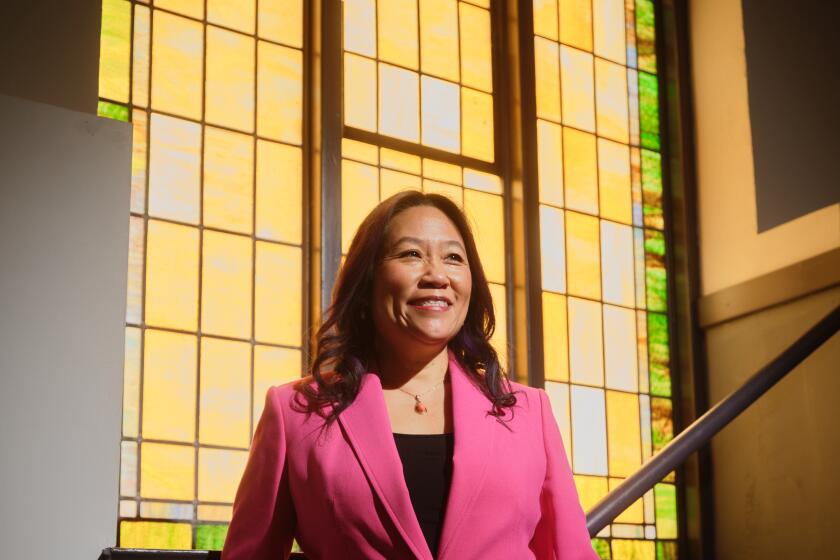Baez Focuses on Her Singing : Music: The folk singer is still politically outspoken, but her musical career is getting a new emphasis.
When Joan Baez last performed at Humphrey’s, in 1987, her showwas interrupted by the ominous sound of military helicopters from North Island on their early-evening maneuvers.
“Just as I figured,” Baez quipped as she watched the aircraft make a clamorous pass at the bayside venue, “as soon as I get to San Diego, they put me under surveillance.”
The “they” was a reference to the U.S. government, in whose hide Baez has been a vociferous thorn throughout her 33-year career. The incident typified Baez’s use of humor to defuse awkward situations, something she has done innumerable times in the course of a public life in which the singer has made as many headlines for her controversial political activities as for her musical endeavors. Baez returns to Humphrey’s Sunday for two shows that will inaugurate the amphitheater’s 1991 season.
At 50, Baez is the doyenne not only of American folk music but of the polymorphous peace movement that took root in the folk boom of the Kennedy era.
But three decades after the protest songs of the original folk revival placed a wake-up call to the American consciousness, the public terrain is now more hostile than ever to people of the “liberal persuasion.” In the face of a current wave of rabid patriotism that would discourage even mild dissent, however, Baez remains a figurehead of resilience and determination.
She was one of the only outspoken opponents of the Persian Gulf War to appear on television and radio at a time when the airwaves were virtually monopolized by an endless parade of hawks and supporters. At war’s end, the Humanitas organization placed an ad in the New York Times that featured Baez’s poem about the war’s destructive waste and cruel aftermath. But if Baez is unwavering in her anti-militarism, she is also aware that her positions play right into the widening path of conservative cynicism.
“Lately, whenever I say something in public, there’s always a relieved reaction from those being driven crazy by this yellow-ribbon mentality,” offered Baez in a recent telephone interview from her home in the community of Woodside, near Palo Alto. “You know, ‘Oh, thank God somebody finally said something.’ But I read somewhere that there’s no recourse against dogma, and logic certainly is ineffectual when you’re dealing with this nationalistic flow against anything approaching humanity and conscience.”
Unlike those in the arts and entertainment fields who either acquiesced or reacted with silent ambivalence to the Administration’s support-the-troops stratagem, Baez remained vocal in her opposition.
“During the war, I went on CNN and faced David Horowitz and some other flaming hawks, and I said that the only good aspect of this support-the-troops thing was the instinct to protect our kids,” said the mother of 21-year-old Gabriel, from her late-’60s marriage to draft resistance leader David Harris. “But I told them they had it all backwards. If you want to protect your kids, you don’t let them become troops in the first place.
“That’s so obvious a statement, though, so logical and simple, that it sounds trite as soon as you say it,” she continued. “My words, while perfectly intelligent and absolutely correct, sounded almost silly! But what else are we going to combat this stuff with?”
Baez laughed at the recollection of a line in Norman Mailer’s recent Vanity Fair article, “How the Wimp Won the War,” in which the author says that the liberal community is “as interesting as hotel furniture.”
“In a funny way, he’s right,” said Baez. “This is a time when we need something new, some missing element, some student leader, something fresh to capture people’s hearts and minds. These are devastatingly shallow times we live in, and the old methods might not work as well anymore. I say this in the context of not having watched TV and not having read the newspaper for the past month, because I just couldn’t stand all this rah-rah war stuff. So I might not be up on the developments of the past few weeks.”
Baez has released 32 albums in this country since 1960, eight of which have earned gold status for sales exceeding a half-million. But her mantel is equally divided between music awards and commendations for her efforts on behalf of nonviolence and civil liberties.
Perhaps the most publicized highlight of Baez’s social activism was her refusal to pay 60% of her income tax (roughly equivalent to the percentage that would go to the Defense Department) from 1964 to 1974. During this personal protest of the Vietnam War, Internal Revenue Service employees waited in the wings at Baez’s concerts to collect the government’s share of her earnings.
Baez has also led or participated in various marches and demonstrations in Washington and elsewhere, boycotted or embargoed events and companies that she deemed politically repressive or insensitive, and performed numerous concerts in support of democratic or humanitarian causes.
In 1965, Baez founded the Institute for the Study of Nonviolence, now known as the Resource Center for Nonviolence. She twice was briefly imprisoned in 1967 on “failure to disperse” charges for her demonstrations at military examination centers. In 1979, she formed the Humanitas International Human Rights Committee to address human-rights violations around the world.
With the Gulf War over, Baez has been able to curtail her anti-war activities somewhat, although on April 30 the Humanitas organization sponsored a heavily attended event in Palo Alto that featured a native Kurd speaking about Kurdish culture, and, of course, a performance by Baez. Her temporary avoidance of current events has also enabled Baez to tap a new wellspring of musical inspiration.
“I’ve alloted myself some time right now to work on my career, which, of course, brings up the question of a distribution of time,” Baez said. “I never gave this kind of concentrated time to the music, and if I’m serious about it then I can’t jump in and try to be a political Joan of Arc right now. I’m in the process of writing and collecting songs.”
Baez’s burst of creative energy, she said, was fueled by the realization that either she would get conscientious about her music being heard, or she would remain “a remnant--a wonderful legend and all that, but someone who wasn’t really listened to anymore. I decided that I wasn’t ready to go invisible yet. And it’s taking a kind of work that I never did before.”
Blessed with a glorious voice whose distinctive, trill-like vibrato ripples emotion and meaning through the most simple lyrics, Baez early on created a classic performance style that remains instantly recognizable. But she knows that reputation alone will not maintain her viability in the current scheme of things.
“For 10 or 15 years, I just sang and people bought my records in great quantities. And then for a number of years they really didn’t buy very many,” she said, laughing. “I realized that there’s only one person who can change that.”
When that determination bears new fruit, don’t expect it to be of an exotic species. She expresses enthusiasm for the Indigo Girls, but Baez is not likely to make any radical overtures to contemporary folk trends.
“It’s curious to me that the music I do best stays the same,” Baez said. “I’m not going to try to be someone else. Janis Ian just wrote a song for me called ‘We Endure,’ and it’s perfect for me: It’s piano and guitar, it’s tuneful, it’s about people’s feelings and overcoming difficulties. So I find that I’m drawn to the same things.”
Nevertheless, Baez admits that she is reconsidering certain aspects of her presentation.
“I might loosen up a little,” she said. “By that I mean I might do some songs I would have rejected in the past because they didn’t seem like ‘me.’ Maybe the ‘me’ is changing to where I don’t have to be so rigid about unwritten rules governing my style. I might sing some lighter things, not everything has to be very serious or have a triple meaning. It’ll probably be a relief for me and my public,” she added, laughing.
But even if Baez again is placing a high priority on her music, it no longer occupies the same niche it did early in her career.
“There was a time when I first started out where it was common for me to play guitar and sing from 4 o’clock in the afternoon until 3 o’clock the next morning,” she recalled. “I’d fallen in love with folk ballads, a new way of life, my sandals and my guitar, and that’s really most of what there was for me. I wasn’t even doing political stuff. Now, when I get home from a tour I don’t really feel like playing guitar. I want to write stories and to introduce myself to things that will occupy more of my time when I retire from singing. But there are certain things I have to do if I want to enjoy this career for a while longer.
“The good news is that I haven’t put a deadline on this new music,” she continued. “For the first time in my life I’m able to carefully develop an album rather than just run in and do it. I’m very excited that I get to stay home and watch the seasons change for the first time in about 22 years. That has been having a very strong effect on my soul, which affects my creative instincts. I have no idea when this album will take shape; I don’t even have a concept for it yet. But I can say it will be good.”
Joan Baez will perform shows at 7 and 9 p.m. Sunday at Humphrey’s, 2241 Shelter Island Drive.
More to Read
The biggest entertainment stories
Get our big stories about Hollywood, film, television, music, arts, culture and more right in your inbox as soon as they publish.
You may occasionally receive promotional content from the Los Angeles Times.






